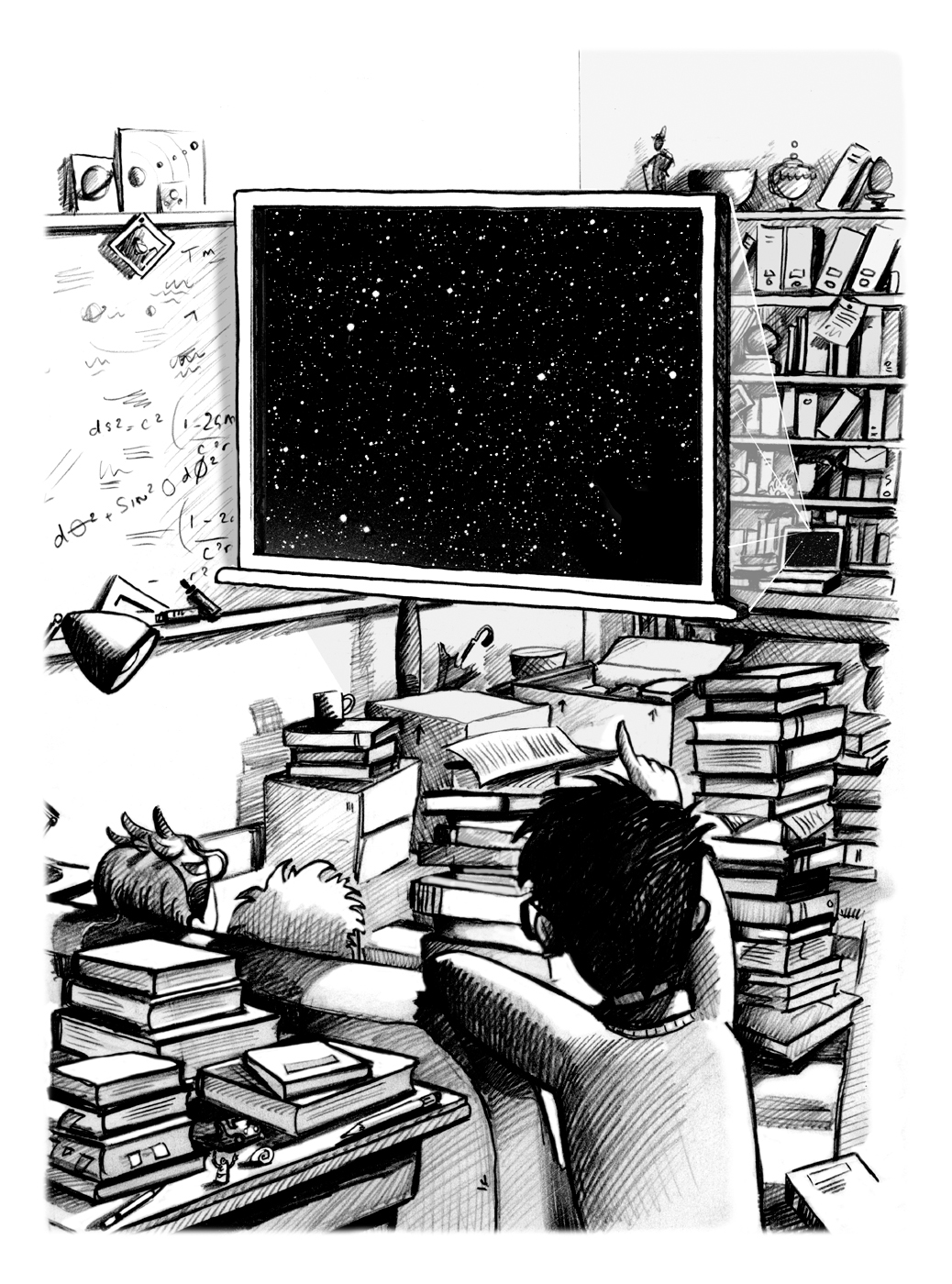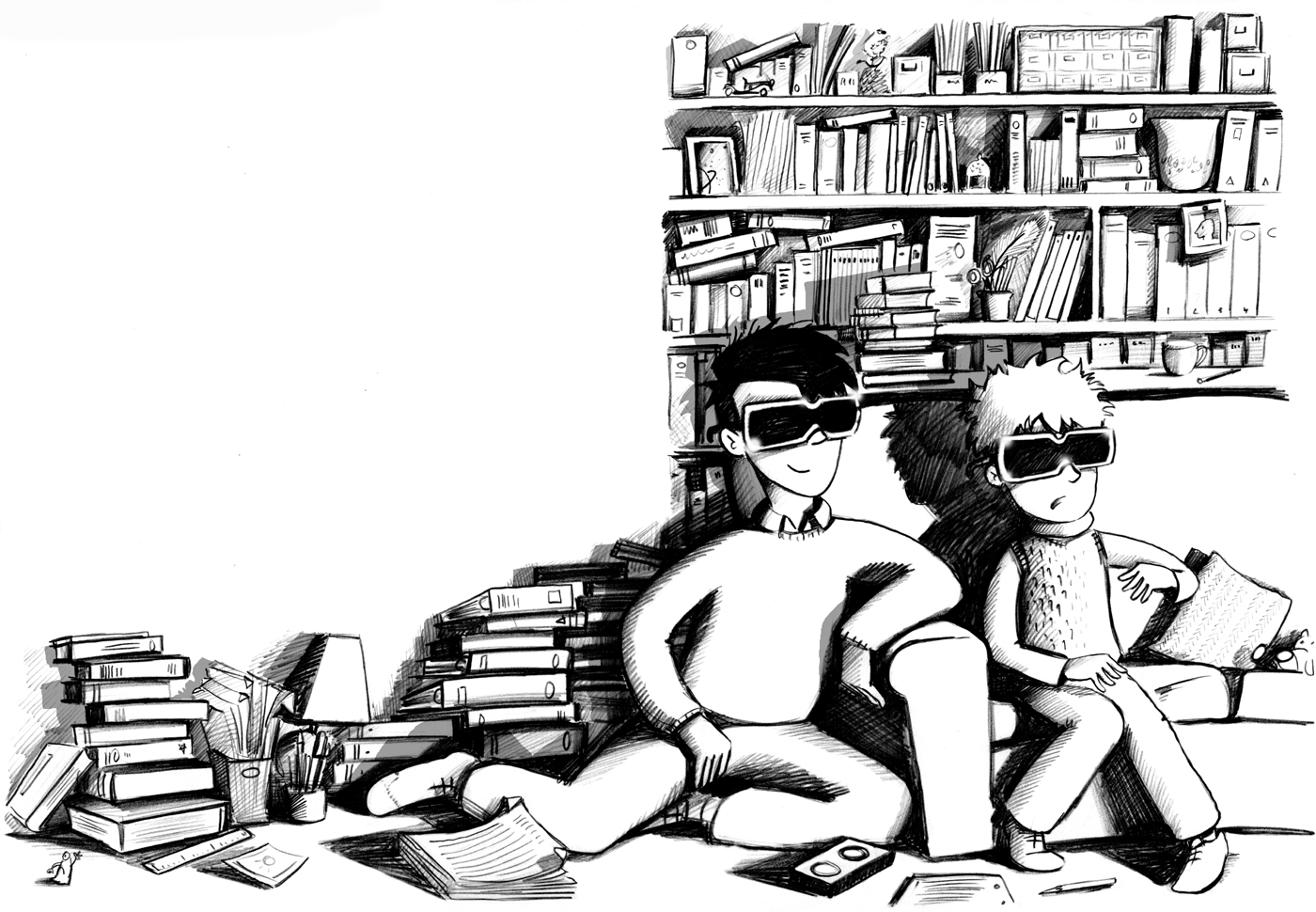— George's Secret Key to the Univers —
by Lucy and Stephen Hawking
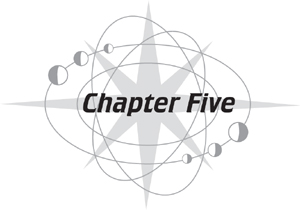
The room was getting darker and darker. “Come and sit here, George,” called Annie, who had already settled herself on the big comfy sofa. George sat down next to her, and after a few seconds he saw a tiny beam of very bright white light. It came directly from Cosmos’s screen. The beam shot out into the middle of the room, where it wavered for a second before it began to sketch a shape in the air. It moved from left to right in a straight line before dropping down toward the floor. Leaving a shining path of light behind it, it turned another corner to make three sides of a rectangle. One more right angle and the beam of light came back to its starting point. For a second, it looked like a flat shape hanging in the air, but suddenly it turned into something real and very familiar.
“But that looks like a—,” said George, who could suddenly see what it was.
“A window,” said Eric proudly. “Cosmos has made us a window on the Universe. Watch closely.”
The beam of light disappeared, leaving the window it had drawn in the middle of Eric’s living room, hanging in midair. Although the outline was still shining with bright light, it now looked exactly like a real window. It had a big sheet of glass in the pane and a metal frame. Beyond it, there was a view. And that view was not of Eric’s house, or of any house, road, or town, or anywhere else that George had ever seen before.
Instead, through the window George could see an incredible, vast darkness, peppered with what looked like tiny bright stars. He started to try and count them.
“George,” said Cosmos in his mechanical voice, “there are billions and billions of stars in the Universe. Unless you are as smart as me, you will not be able to count them all.”
“Cosmos, why are there so many?” asked George in wonder.
“New stars are created all the time,” answered the great computer. “They are born in giant clouds of dust and gas. I am going to show you how it happens.”
“How long does it take for a star to be born?” George asked.
“Tens of millions of years,” replied Cosmos. “I hope you are not in a hurry.”
“Tut-tut,” said Eric, sitting cross-legged on the floor beside the sofa, his long, thin limbs bent at sharp angles. He looked like a friendly giant spider. “Don’t worry, George, I’ve speeded it up quite a lot. You’ll still get home for dinner. Annie, pass the chips around. I don’t know about you, George, but the Universe always makes me very hungry.”
“Oh dear,” said Annie, sounding embarrassed. There was a rustling noise as she rooted around inside the big bag. “I’d better get some more.” She leaped off the sofa and dashed back to the kitchen.
As Annie left the room, George noticed something about the view through the window onto outer space: Not all of it was covered with little stars. In the bottom corner of the window he saw a patch of total darkness, a place where not a single star shone.
“What’s happening there?” He pointed.
“Let’s have a look, shall we?” said Eric. He pressed a button on a remote control, and the view through the window seemed to zoom toward the dark patch. As they got closer, George realized that an enormous cloud was hovering in that spot. The window kept moving forward until they were right inside the cloud itself, and George could see it was made of gas and dust, just as Cosmos had said.
“What is it?” he asked. “And where is it?”
“It’s a huge cloud in outer space, much bigger than the ones in the sky,” replied Eric, “made up of tiny, tiny particles that are all floating around inside it. There are so many of these particles that the cloud is enormous—it’s so big that you could put millions and millions of Earths inside it. From this cloud, many stars will be born.”
Inside the cloud, George could see the particles moving around, some joining together to form huge lumps of matter. These great lumps spun around and around, gathering even more particles all the time. But as the particles joined together, the spinning lumps weren’t getting bigger; instead, they seemed to be getting smaller, as though something was squeezing them. It looked like someone was making gigantic dough balls in outer space. One of these giant balls was quite close to the window now, and George could see it spinning around, getting smaller and smaller all the time. As it shrank, it became hotter and hotter—so hot that George could feel the heat from where he sat on the sofa. And then it started to glow with a dim but frightening light.
“Why is it glowing?” asked George.
“The more it shrinks,” said Eric, “the hotter it gets. The hotter it gets, the brighter it shines. Very soon it’s going to get too hot.” He grabbed a couple of pairs of strange sunglasses from a pile of junk on the floor.
“Wear these,” he told George, putting on a pair himself. “It will soon be too bright for you to look at without glasses.”
Just as George put on the very dark glasses, the ball exploded from the inside, throwing off its outer layers of burning-hot gas in all directions. After the explosion, the ball was shining like the Sun.
“Wow!” said George. “Is that the Sun?”
“It could be,” Eric replied. “That’s how stars are born, and the Sun is a star. When a huge amount of gas and dust combines and shrinks to become dense and hot, as you’ve just seen, the particles in the middle of the ball are so pressed together they start to fuse or join up, releasing an enormous amount of energy. This is called a nuclear fusion reaction. It is so powerful that when it starts, it throws off the outer layers of the ball, and the rest is transformed into a star. That’s what you just saw.”
The star was now shining steadily in the distance. It was a beautiful sight. Without the special sunglasses, they wouldn’t have been able to see much because the star was so bright.
George gazed at it, amazed by its power. Every now and then he could see huge jets of brightly shining gases sent hundreds of thousands of miles from the surface at extraordinary speeds.
“And the star will keep on shining like this forever?” he asked.
“Nothing is forever, George,” said Eric. “If stars shone forever, we wouldn’t be here. Inside their bellies, stars transform small particles into larger ones. That is what a nuclear fusion reaction does: It fuses small particles together, and builds big atoms out of small ones. The energy released by this fusion is enormous, and that’s what makes stars shine. Almost all the elements that you and I are made of were built inside stars that existed long before the Earth. So you could say that we are all the children of stars! When they exploded a long time ago, these stars sent into outer space all these large atoms they created. The same will happen to the star you are looking at now, behind the window. It will explode at the end of its life, when there are no more small particles available to fuse into bigger ones. The explosion will send into outer space all the large atoms the star created in its belly.”
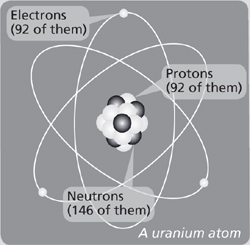
On the other side of the window, the star was looking angry. Its bright yellow color was turning reddish as it grew and grew, until it was so big that it was almost impossible to see anything else through the window. It seemed to George that the star might explode at any moment. Eric pressed his remote control again, and the window immediately moved away from the star, which kept getting redder and bigger all the time.
“Isn’t it amazing!” exclaimed Eric. “At first the ball shrinks and gives birth to a star, and then the star gets bigger and bigger! And now it is about to explode! Whatever you do, don’t take off your glasses.”
George watched the star in fascination. Suddenly, long after it had reached a size no one could have imagined, the most powerful explosion George had ever seen happened just in front of him. The whole star blew up, sending into outer space enormous quantities of light and red-hot gas, including all the new atoms it had created. After the explosion, George saw that all that was left of the star was a beautiful new cloud, full of extraordinary colors and new materials.
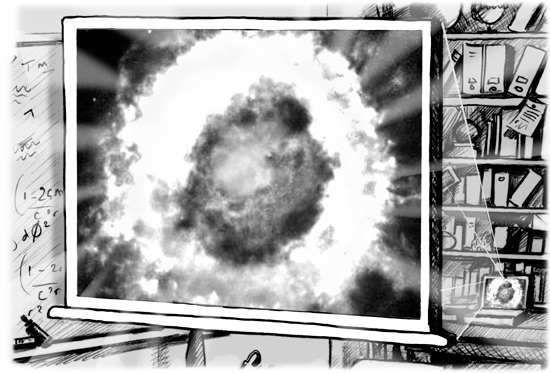
“Ooooh-ahhhh!” he said. It was like watching the most incredible fireworks display.
“You see,” said Eric, “with time, the colorful cloud you now see will mix with other clouds, ones from far distant stars that have also exploded. As they cool down, all the gases from these clouds will mix together into an even bigger cloud, where stars will be born again. Near where these new stars appear, the leftover elements will gather together to become objects of various sizes—but not ones big enough to become stars themselves. Some of these objects will become balls, and with time, these balls will turn into planets. In real life, it takes a very long time for all this to happen—tens of millions of years!”
“Wow!” George was fascinated.
“But we haven’t got that much time to wait, and you need to get home for your supper,” said Eric, going over to Cosmos and pressing a few more keys. “So let me speed it up a bit. Here we go!”
In the blink of an eye, the tens of millions of years Eric was talking about had passed. The gas from the explosion of dozens of stars had gathered into an immense cloud. Within this cloud, new stars were appearing everywhere, until one formed just in front of the window. That star’s brightness made all the other stars very difficult to spot. Some distance away from this new star, the gas left over from the cloud was becoming very cold and had started to gather into small, icy rocks. George saw that one of these rocks was heading straight for the window. He opened his mouth to warn Eric, but the rock was traveling far too quickly. Before George could say anything, it smashed into the glass with a shattering, splintering roar, seeming to shake the whole house.
George jumped in fright and fell off the sofa. “What was that?” he shouted to Eric.
“Oops!” said Eric, who was typing away on Cosmos. “Sorry about that. I wasn’t expecting to take a direct hit.”
“You should be more careful,” said Cosmos crossly. “This isn’t the first time we’ve had an accident.”
“What was it?” asked George, who found he was clutching a small teddy bear that Annie must have left on the sofa. He was feeling rather dizzy.
“We were hit by a tiny comet,” admitted Eric, who was looking a little sheepish. “Sorry, everyone. I didn’t mean for that to happen.”
“A tiny what?” asked George, feeling the room spin around him.
Eric typed a few more commands into Cosmos. “I think that’s enough for today,” he said. “Are you all right, George?” He took off his glasses and peered into George’s face. “You look a little green.” He sounded worried. “Oh dear, I thought this was going to be fun. Annie!” he called into the kitchen. “Can you bring George a glass of water? Oh dear, oh dear.”
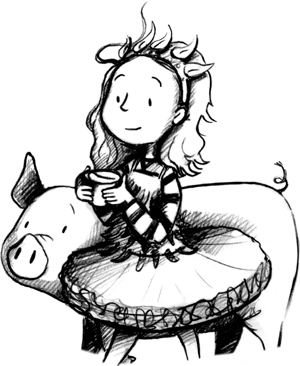
Annie came in, walking on tiptoe. She was carefully holding a very full teacup of water, some of which was sloshing over the side. Freddy the pig was glued to her side, casting adoring glances up at her with his piggy eyes. She held the cup out to George.
“Don’t worry,” she said kindly. “I felt really sick too, my first time. Dad”—it was a command—“it’s time to let George go home now. He’s had enough of the Universe.”
“Yes, yes, I think you’re right,” said Eric, still looking concerned.
“But it was so interesting!” protested George. “Can’t I see some more?”
“No, really, I think that’s enough,” said Eric hurriedly, putting on a coat. “I’m going to walk you back to your house now. Cosmos, you’re in charge of Annie for a couple of minutes. Come on, George, bring your pig.”
“Can I come back?” said George eagerly.
Eric stopped fussing around with coats and keys and outdoor shoes and smiled. “Certainly,” he said.
“But you must promise not to tell anyone about Cosmos,” Annie added.
“Is it a secret?” asked George, eagerly.
“Yes,” said Annie. “It’s a huge great big ginormous amazing secret that is a trillion gazillion times bigger than any secret you’ve ever heard before.”
“Now, Annie,” said Eric sternly, “I’ve told you that gazillion is not a real number. Say good-bye to George and his pig.”
Annie waved and gave George a smile.
“Good-bye, George,” said Cosmos’s voice. “Thank you for making use of my exceedingly powerful capacities.”
“Thank you, Cosmos,” said George politely.
With that, Eric ushered him and Freddy into the hallway and out of the front door and back to their real lives on planet Earth.

